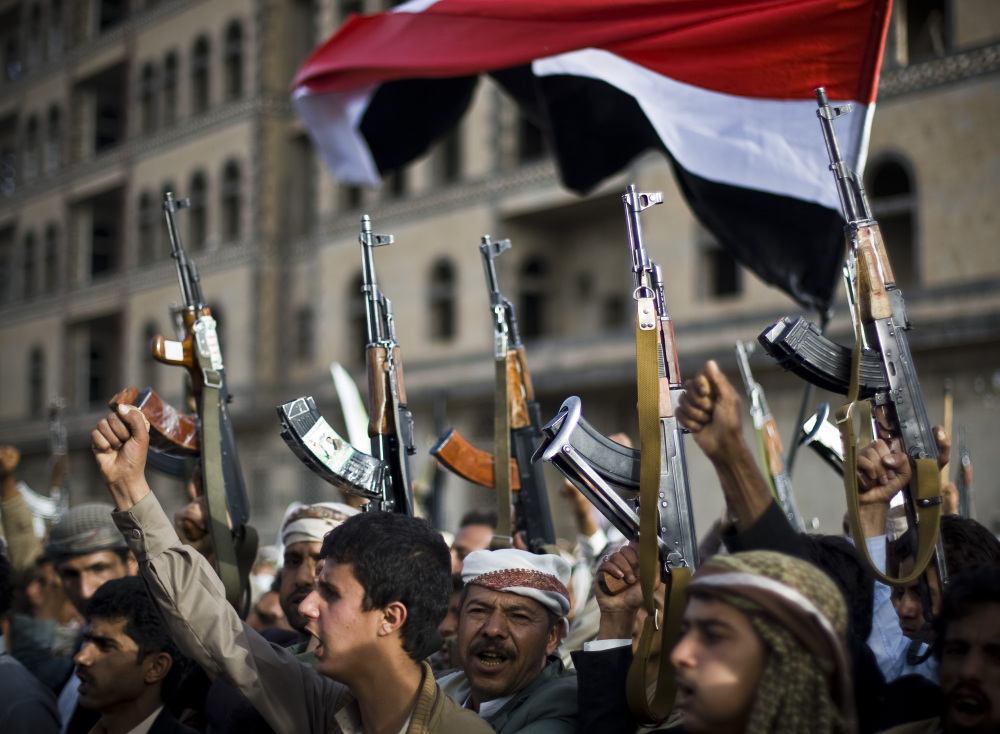SANAA, Yemen — Pakistan’s parliament voted unanimously Friday to stay out of the Saudi-led air campaign targeting Shiite rebels in Yemen, offering instead to mediate a solution, in a blow to Saudi Arabia’s attempts to build a Sunni front in an increasingly sectarian conflict.
Pakistan’s decision is unlikely to greatly affect the Saudi-led coalition’s military capabilities. But it was an embarrassment to the kingdom from a traditionally close ally, now reluctant to get pulled into a conflict that is threatening to escalate into a new proxy war between Saudi Arabia and Iran.
Saudi Arabia had been seeking to expand the coalition, made up of fellow Gulf nations as well as Egypt and Sudan, which has waged a nearly 3-week campaign of airstrikes against the rebels, known as Houthis, and is reportedly considering a ground invasion. At the same time, Shiite powerhouse Iran, which backs the Houthis, also lobbied Pakistan and other Sunni nations to back a cease-fire and a negotiated end to the conflict.
A senior official in the United Arab Emirates – a member of the coalition – lashed out angrily at Pakistan, accusing it of choosing Iran over the Gulf nations at a time when they face an “existential confrontation” in the Yemen conflict.
Anwar Gargash, the UAE’s minister of state for foreign affairs, said on his Twitter account that Pakistan should look out for its strategic relations with Gulf nations, pointing to the Gulf’s economic and investment help to the South Asian nation.
“Contradictory and ambiguous positions in this existential matter will cost (Pakistan) dearly,” he wrote.
Airstrikes along with escalated fighting on the ground between the Houthis and supporters of Yemen’s beleaguered president threaten to push Yemen, the Arab world’s poorest country, into collapse. On Friday, the U.N. and International Committee of the Red Cross succeeded in bringing in the first two plane loads of aid, delivering tons of medical and humanitarian supplies to the capital, Sanaa, to relieve hospitals overburdened by casualties.
Saudi Arabia and its allies, including the United States, accuse Iran of arming the Houthis. The Gulf countries view the rebels’ power grab as a move by Iran to establish a stronghold on their southern flank.
Iran says it backs the rebels politically and with humanitarian aid but denies sending weapons.
The Houthis have full or partial control over 11 of Yemen’s 22 provinces, backed by military units loyal to ousted autocrat Ali Abdullah Saleh.
Send questions/comments to the editors.



Success. Please wait for the page to reload. If the page does not reload within 5 seconds, please refresh the page.
Enter your email and password to access comments.
Hi, to comment on stories you must . This profile is in addition to your subscription and website login.
Already have a commenting profile? .
Invalid username/password.
Please check your email to confirm and complete your registration.
Only subscribers are eligible to post comments. Please subscribe or login first for digital access. Here’s why.
Use the form below to reset your password. When you've submitted your account email, we will send an email with a reset code.